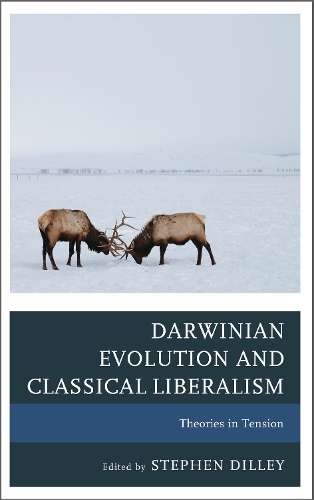
Darwinian Evolution and Classical Liberalism: Theories in Tension
(Paperback)
Publishing Details
Darwinian Evolution and Classical Liberalism: Theories in Tension
By (Author) Stephen C. Dilley
Contributions by Logan Paul Gage
Contributions by Bruce L. Gordon
Contributions by Shawn E. Klein
Contributions by Peter Augustine Lawler
Contributions by Roger Masters
Contributions by Angus J. L. Menuge
Contributions by Michael J. White
Contributions by Jay W. Richards
Contributions by Timothy Sandefur
Bloomsbury Publishing PLC
Lexington Books
26th March 2015
United States
Classifications
Professional and Scholarly
Non Fiction
Centrist democratic ideologies and movements
320.512
Physical Properties
Paperback
342
Width 151mm, Height 231mm, Spine 25mm
503g
Description
Darwinian Evolution and Classical Liberalism canvasses an array of thinkers from the past to the present as it examines fundamental political, philosophical, ethical, economic, anthropological, and scientific aspects of the ferment between Darwinian biology and classical liberalism. Early chapters focus on classical thinkers like John Locke and Adam Smith, while later chapters provide analyses of present-day classical liberals, focusing especially on F.A. Hayek, Thomas Sowell, and Larry Arnhart, the most prominent advocates of contemporary classical liberalism. Thematically, the volume falls into three parts. Part I examines foundational matters, arguing that Darwinism and classical liberalism hold incompatible visions of morality, human nature, and individual autonomy. This section also contends that the free markets spontaneous order is fully compatible with a teleological (or non-Darwinian) view of the universe. Part II turns to contemporary applications, contending that Darwinism and classical liberalism are at odds in their views of (or implications about) limited government, vital religion, economic freedom, and the traditional family. This section also argues that, since its inception, Darwinism has attenuated core tenets and values of classical liberalism and Western civilization. Part III of the volume contains alternative views to those in the first two parts, adding critical diversity to the book. Respectively, these chapters hold that Darwinian evolution simply has little to say about classical liberalism; an evolutionary account of human volition is fully compatible with the individual choice presupposed in classical liberalism; and evolutionary naturalism, unlike religious alternatives, provides a strong foundation for freedom, morality, and the traditional family.
Reviews
Should free citizens ever succumb to the metaphysical madness of determinism, Alexis de Tocqueville once warned, democracy would be doomed. Darwinian Evolution and Classical Liberalism is a nuanced yet definitive rebuke of the neo-Darwinian notion that human beings are ultimately governed by biological force fields beyond their control. In tracking the consequences of this metaphysical madness for the science and practice of politics, this volume renders an invaluable service to democracy and all who love liberty. -- Reed Davis, Seattle Pacific University
Author Bio
Stephen Dilley is associate professor of philosophy at St. Edwards University in Austin, Texas. In addition to political philosophy, his areas of interest include the history and philosophy of biology. He has published essays in British Journal for the History of Science, The Journal of the International Society for the History of Philosophy of Science, Philosophia Christi, Journal of Interdisciplinary Studies, and elsewhere. With Nathan Palpant (University of Washington), Dilley is editor of Human Dignity in Bioethics: From Worldviews to the Public Square (Routledge, forthcoming).
